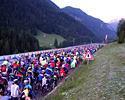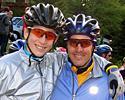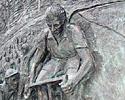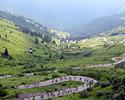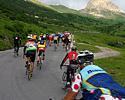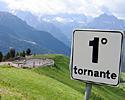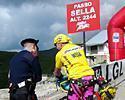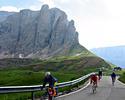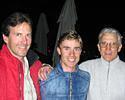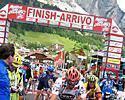
Recently on Cyclingnews.com |
91st Tour de France - July 3-25, 2004
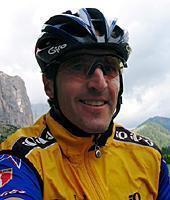 |
Davis Phinney's Tour Diary: A Sprinter's Tale
With over 300 national and international victories in a career that spanned two decades, Davis Phinney is still the winningest cyclist in U.S. history. In 1986, he was the first American ever to win a road stage in the Tour de France; five years later, he won the coveted USPRO road title in Philadelphia.
 In
2000, when Davis was just 40 years old, he was diagnosed with early-onset Parkinson's
disease. But that hasn't kept him down. Since retiring from professional cycling,
Davis has been a cycling sports commentator, public speaker and journalist.
He brings his passion for those two-wheeled machines to Cyclingnews for
the 2004 Tour de France.
In
2000, when Davis was just 40 years old, he was diagnosed with early-onset Parkinson's
disease. But that hasn't kept him down. Since retiring from professional cycling,
Davis has been a cycling sports commentator, public speaker and journalist.
He brings his passion for those two-wheeled machines to Cyclingnews for
the 2004 Tour de France.
Maratona delle Dolomiti, Corvara, Italy, July 4, 2004
Random thoughts from the Dolomiti
This is the first year that I will be back to the Tour de France since I last rode the race in 1990, the year my son Taylor was born. For the past two days as with much of the rest of the World, I've been watching the Tour on TV. I'll be joining the Tour with High Gear Travel and 80 clients next weekend, and I've been invited by Cyclingnews to give commentary on the Tour.
At the moment, I'm here in Corvara, Italy, participating with our Bike Camp group in the Maratona delle Dolomiti. Our group of 30 along with more than 8000 other well-trained cyclists has taken the challenge of the Dolomites today, free of cars but filled with cyclists. This is one of the classic Gran Fondos (a mass participation ride) in Italy and one of the most popular. The feeling in the air here is not so different as you find at the Tour, minus of course, thousands of spectators.
At the start, three helicopters hover shooting the splendor of the start (at dawn). Race motorcycles, police, the announcers, and the inevitable smell of liniment bring back memories of racing. To some this is truly a race - but to most of us, we're here for the challenge that these stunning mountains offer. As with the Tour de France, this Gran Fondo offers an experience of a lifetime, and one not soon forgotten.
As a sprinter I never relished the mountains, yet I learned to manage them - or at least endure them. It's part of my backbone, and what has allowed me to endure a physical decline that has come with my diagnosis of Parkinson's Disease four years ago. I reflect on this while descending to the start line at o'dark hundred hours (5:30 am) as the experience is altogether bittersweet. Cycling has become increasingly difficult and the mountain environment is especially unforgiving.
As in the Tour and my days with 7-Eleven - my team, family and friends, is there to support me, or in this case, at least to see me to the start line. After that, by choice, I'm on my own. As always these days, my wife Connie Carpenter makes everything as easy as possible for me. And today, poignantly, my 14 year-old son Taylor stands with me at the start, ready to ride. It's his first Gran Fondo.
Damiano Cunego, the 22 year-old Giro d'Italia champion, fires the starters pistol and we are off. While the Tour sprinters have a week or more to flex their muscles on the buildup to the mountains, here you're climbing straight away toward the first pass, the Campolongo. And fairly quickly, the PD related dysfunction in my pedal stroke causes me trouble (I can't get much, if any, power to the left side). Just as quickly, Taylor reaches out to push me - as my former teammate Sean Yates would occasionally do if I faltered in the Tour. Pride takes precedence, however, and as there is nothing to be gained by holding Taylor back - I release him with a squeeze of the hand to ride ahead with Connie. She struggles to keep up as he dances youthfully away and she strives to keep him in sight. By the next bend they are gone.
As a precaution against becoming bogged down in this Maratona, I've exchanged my prized Dura-Ace crankset for a compact crank from FSA, which features a 34 inner chain ring (12-27 in the back). The gearing suits - as I'm just not ready psychologically for a triple yet. But getting passed by thousands of riders take some getting used to as I settle in at my diminished pace. As a distraction, I muse about the Tour and the field sprints yet to come.
Having watched sprint king Alessandro Petacchi win a record nine stages in the Giro, it is clear he's the fastest sprinter in the world. What's most impressive to me is how well he handles the pressure of an entire team built around and dedicated to him, knowing you have to deliver every day in the unforgiving and wild world of pack sprinting. More importantly, to come off his teammate's wheel at 70km/hr and accelerate above that, is awe-inspiring. At that speed, in my day - before the advent of the 11 tooth cog - I would have been unable to accelerate and would find myself out of gear. Still, having an 11 is one thing, being able to turn it over - at the end of the race after a fast run-in is altogether another. The only sprinter capable of consistently holding Petacchi's wheel at the Giro, was Robbie McEwen, but watching him come off the wheel and make up any ground was akin to looking up FUTILITY in the dictionary. The meaning is obvious.
But that was a month ago and in a way, a world apart. The Tour's a different animal and far more difficult for one team to control - that's the challenge facing Petacchi and his Fassa Bortolo team. This year, the Tour has a plethora of fast finishers, guys like Cooke, Zabel, and Boonen in addition to McEwen come to mind. Thankfully (hello?), the Tour has invited, in my opinion the greatest sprinter ever, Mario Cipollini. Cipo may be past his prime, but he has clearly earned his place to be there. After Lance Armstrong and Jan Ullrich, he is, globally speaking, the best-known rider in the race.
Crossing over the Passo Pordoi and its 33 switchbacks, gives me morale and I'm functioning better. On the following two passes (the Sella and the Gardena), I start to enjoy my ride. I soak in the environment, the various languages, the views, and frequently stop to take photos. As I roll into Corvara to finish my ride - four passes, 57 km and almost 6000 feet of climbing later - my finishing time is close to the winner of the long loop - 147 km and 13,000 feet of climbing over seven passes. I let my bike run on the descent into Corvara and roll gently to the finish line, no sprint - more like a whimper - and yet am gratified to have simply finished just as I once was in the mountain Tour stages. I proved myself capable of doing something that many in my current situation would not find possible.
Hours later, we watch the tour finish in Charleroi. The first sprint stage marred by rain and crashes shows that Petacchi's form is not yet there. His team is unable to control the final kilometer, opening the door to the others. Jaan Kirsipuu is the surprise winner and nips the rash Robbie McEwen who charges through the final meters for second place. McEwen boldly switches Petacchi and comes in fastest but runs out of road, barely missing a stage victory. For the sprinters, the Tour is now clearly underway. And it's going to be great.
Photography
Images by Davis Phinney
- The riders queue up at the o'dark hundred hour of 5.30am.
- View looking towards the start.
- My wife Connie Carpenter with Sportful Marketing VP Steve Smith.
- The Phinney boys - like father, like son.
- Anticipation...
- Entertinment at the rest stops (feed zones).
- Coppi memorial - Passo Pordoi was the 'Cima Coppi' in the '02 Giro.
- 33 switchbacks on the Pordoi!
- Climbing the Pordoi
- Sunrise over the Campolongo pass.
- Climbing the Passo Sella.
- View to the Marmolada Glacier.
- This guy is definitely lost... and could do with a change of tights.
- Descending the Sella
- Still descending the Sella, looking out to the Gardena Pass.
- Damiano Cunego with Antonio Cappeletti, former soigneur for Motorola, and yours truly.
- Finally... the finish.
- Still smiling.
- Some of the best roads in the world.
- Contrasting tools. Note the kick-stand and the bike lock.

